I recently had a chance to relive part of the three-month kayak expedition of my youth. After not being away from home or my kids for more than five days in the past 10 years, I received a one-week getaway as a birthday gift from my wife.
“Mom bought me a plane ticket to British Columbia!” I announced to my kids.
“But she has to buy you a ticket to come back,” my 8-year-old son complained.
“Don’t worry, it’s not a one-way ticket,” I explained with a laugh.
Yet, my son was correct in thinking there was some uncertainty concerning my return. After kayaking the B.C. coast for 80 days in 2002, returning to conventional life was not easy. At the time, I’d seriously considered carrying on where I’d left off, southward along the U.S. to Baja and beyond, to circumnavigate the continents like Verlen Kruger or Freya Hoffmeister. Instead, I’d married, acquired a house and a dog, had two kids and spent too much time pining for waters not traveled.
“Thinking about our trip makes me melancholy,” my expedition partner Dave lamented recently. “It was such an amazing time. I had this feeling like, ‘This is what’s real, this is what matters.’ And I look around at my life now, and the world that we live in, and I miss those days.”
Over the years, I’ve struggled with similar feelings. So, it was with some trepidation my wife handed over the ticket to the one thing that most competes with her for my attention. It was as if she was giving me a pill that would either kill me or cure me, hoping I’d come home with the piece of myself I’d left back there 17 years ago.
Friends joked about her “master plan,” noting it was no accident she’d booked the flight in November, one of the bleakest months to visit Vancouver Island. The weather could at least be counted on to blot out any rosy romanticization of the West Coast.
The trip begins
I arrived in Victoria with a come-hell-or-high-water determination to revisit part of the coast we’d traveled. I borrowed a kayak and, when Dave’s SUV threatened to throw a wheel bearing in Nanaimo, we borrowed a pickup truck to get us the rest of the way to Tofino, two sea kayaks teetering on the roof of the tiny cab. The raincloud shrouding the mountain passes matched the fogginess of my memory. It was like I’d traveled back in time to a past called B.C.—Before Children.
Along the way, I kept saying things like, “This is probably going to be miserable, but I just want to do it anyway,” justifying why we were going camping on the ocean in the cold November rain.
It was with almost comic nonchalance we launched our middle-aged selves into the frigid waters. Years of experience had yielded complacency. Dave eschewed the wetsuit he wore for the entire balmy summer of 2002 for a pair of nylon pants and thrift store running shoes. With dusk approaching and visibility at near zero, we dead-reckoned our way to an offshore island, tracking the swell direction and the sound of surf until the trees of our destination loomed out of the fog.
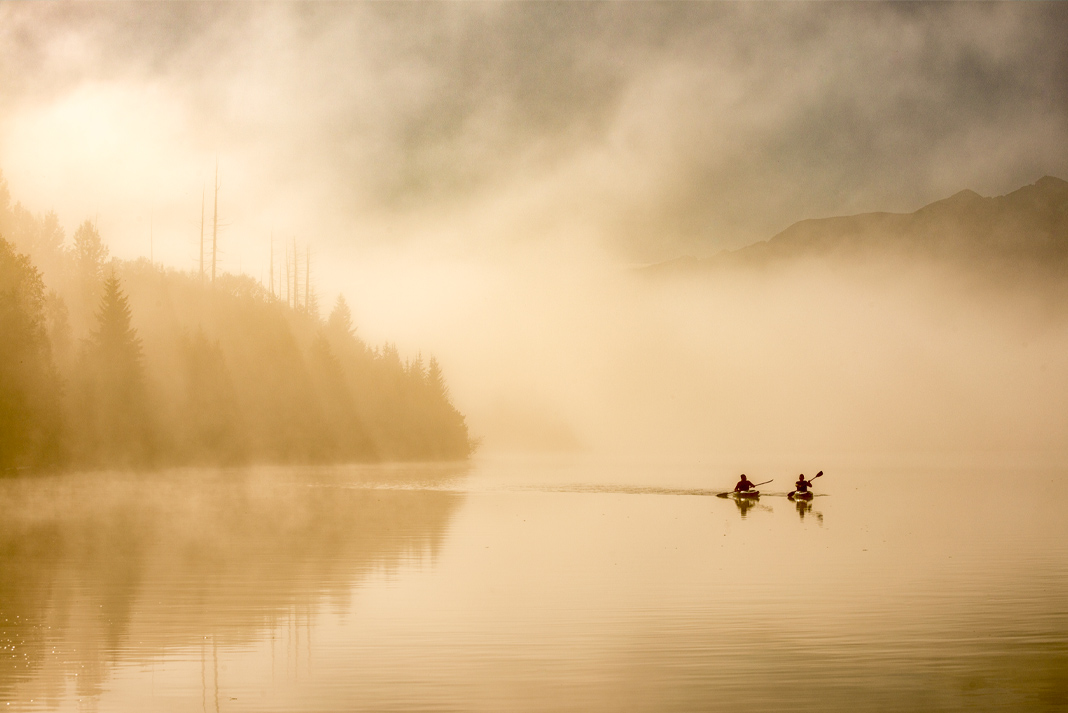
It was almost dark when we scanned the beach for a sheltered spot. A wolf loped along the sand and scrambled up a rocky bluff. A low surf peeled along the shore.
We pitched tents in a steady drizzle, boiled tortellini, washed dishes with sand and seawater by headlamp and settled in for a long, dark evening of cribbage under the tarp.
I went to bed early and slept for 12 hours. The next day we hiked a string of desolate surf-swept beaches, spotted a humpback whale feeding offshore, and impassively observed the majesty of the rainforest, with Sitka spruce the circumference of my Toronto living room.
There was nothing sensational about a damp West Coast beach in winter weather. No oracles speaking from the trees, no sunbeams shining Godlike through the clouds. Nothing much was happening out here besides the boom of surf, the drip of rain, the chatter of birds, a slight ache in my back. Some might have called it miserable and more than a little boring.
“Two nights is definitely enough,” I remarked to Dave. “I mean, this is great and all, but I’m good.”
“Me too,” he said.
The return to civilization
When we returned to Tofino, lining up in the rain at the taco truck with the surfers and tourists for sloppy gringa sandwiches and fish tacos was pure bliss. I couldn’t imagine anything better than trading my wet clothes for a cotton hoodie and climbing into a warm truck with a steaming coffee and a fresh Nanaimo bar. It felt like the whole point of suffering the cold and wet for a couple of nights was to enjoy the return to civilization properly. In this case, the joy I was looking for through kayaking came not from the paddling itself, but—unexpectedly—in the non-kayaking that followed.
There’s a meditation exercise I sometimes do that instructs you to push aside all thoughts and focus on your breathing. It’s almost impossible. Then at the very end, you’re told to let all those thoughts back in—and suddenly they’re gone. Your awareness is as blank as a blue sky at noon.
To benefit from meditation, you’re supposed to not try to benefit. You succeed through a deliberate, focused effort of not aiming where you want to go. This is the Buddhist concept of non-doing, the idea there is power in letting go.
For me, it’s the same with writing. I won’t get anywhere until I step away from the computer. Then I’m scrambling to scribble down the ideas flooding in while I’m going for a run or having a shower.
There’s a lesson in all this. It’s not my kayaking skills needing perfecting; it’s my non-kayaking skills. My particular lousiness at the non-kayaking aspect of kayaking is a huge blind spot since it’s how I spend 99 percent of my life.
I can relate to Mark Twight, the former professional alpinist who just published a book, Refuge, inspired by his quest to adapt to life on the ground and “see beauty in the mundane” since quitting climbing way back in 2000.
“When the trivia I once mocked from the highest mountains became my daily life, I realized I need to assimilate, I need to integrate down here, or I’m going to be the guy who goes out with drugs and alcohol or goes back to climbing again and doesn’t come back,” he said in an interview. “It can be really good down here if you accept it. If you open your eyes and see it. It can be really fucking good.”
Much of the meaning I’ve mistakenly ascribed to my paddling experiences has instead come from the intersection of kayaking and non-kayaking.
A change in perspective
What I took to be the wilderness experience was actually the experience of regarding the wilderness from my perch in the city, wanting to get back there without realizing the experience I sought was essentially one of not wanting to be anywhere else. When I went out to find it, it was not there, until I stopped looking.
The defining moment of my trip came not on a Pacific island beach but the return flight, peering out the window as the mountains of the West were replaced by the blandness of the city’s industrial suburbs. I felt a flood of angst and regret. Then I made a different choice and let go—the lesson I should have taken from the wilderness in the first place.
The West Coast was beautiful beyond words, but not a place I needed or wanted to stay in forever. And, it turns out, not all that difficult to visit.
And it’s really fucking good to be home.
Tim Shuff is a former editor of Adventure Kayak magazine.
Ready, set, let go. | Photo: Destination BC/Michael Bednar



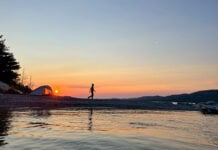
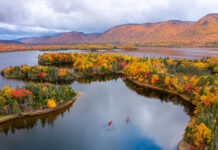
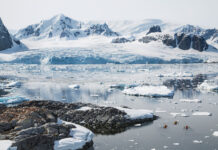
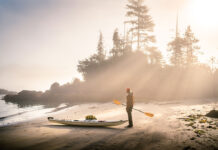
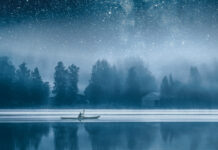

Great diary of your kayak experience. Thank you for sharing. Surely this will stay with you as it does with me and my West Coast Mothership kayaking expedition